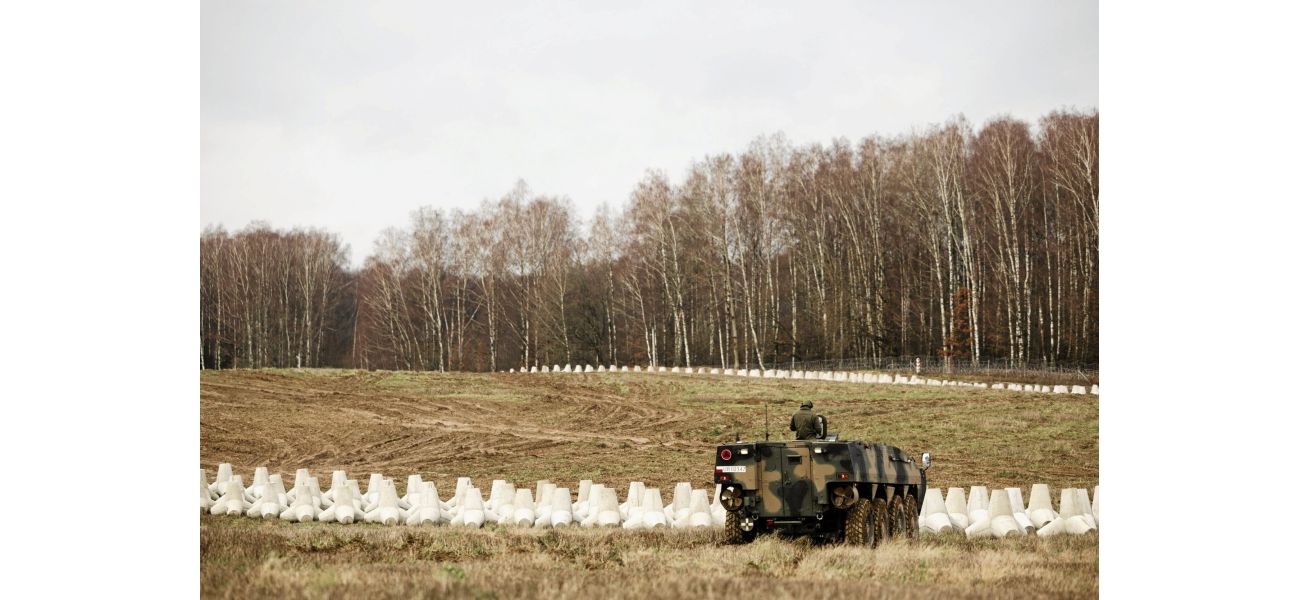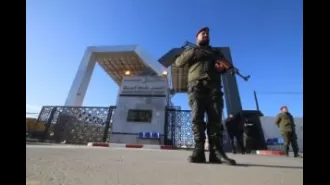Nato is getting ready for battle by investing £2 billion in a defensive barrier on the Russian border.
Biggest program in Europe since WWII.
November 30th 2024.

The eastern border of Poland has been a topic of concern lately as the country has begun construction of fortifications to protect against potential threats from Russia. These fortifications include anti-tank barriers, surveillance systems, and trenches, and come with a hefty price tag of £2 billion. This is the largest project of its kind in Europe since the end of World War II, showcasing the seriousness of the situation.
The goal of this project, known as 'East Shield', is to fortify the borders between Poland and Belarus, as well as the Russian exclave of Kaliningrad. The main objective is to deter any aggressive actions from Vladimir Putin and his imperialist ambitions. Prime Minister Donald Tusk, who recently visited the construction site, sees this as an investment in peace for the country.
During a news conference, Tusk stood in front of the concrete anti-tank barriers and emphasized the importance of a well-guarded Polish border. He believes that the stronger the border, the harder it will be for those with malicious intentions to enter the country. This is especially important for Poland, as it has a history of facing aggressive neighbors and is now taking a leading role in European security, alongside weakened countries like France and Germany.
The Polish government plans to allocate 4.7% of its gross domestic product towards defense next year, which will make it one of the top NATO countries in terms of defense spending. The famous 'hedgehogs', or anti-tank barriers, are just one aspect of the fortifications being set up along the borders with Russia, Belarus, and Ukraine, which are the easternmost borders of both the European Union and NATO. Tusk also mentioned the possibility of expanding the East Shield to protect the Baltic states of Estonia, Latvia, and Lithuania in the future.
The Prime Minister emphasized that these fortifications are meant to deter any potential aggressors and promote peace in the region. He also stated that the investments being made by Poland have been met with positive reactions from the rest of Europe. In fact, other countries such as Germany, Sweden, Finland, and Denmark are also taking measures to prepare for potential conflicts. Germany is developing bunker plans and an app to help citizens locate shelters in case of an attack, while Sweden and Finland have distributed guides for emergency preparedness. Even Denmark has sent emails to its citizens with details on necessary supplies for a crisis situation.
In conclusion, Poland is taking proactive steps to ensure the safety and security of its borders, and is receiving support from other European countries. The East Shield project, although expensive, is seen as a necessary investment in peace and serves as a strong deterrent against potential aggressors.
The goal of this project, known as 'East Shield', is to fortify the borders between Poland and Belarus, as well as the Russian exclave of Kaliningrad. The main objective is to deter any aggressive actions from Vladimir Putin and his imperialist ambitions. Prime Minister Donald Tusk, who recently visited the construction site, sees this as an investment in peace for the country.
During a news conference, Tusk stood in front of the concrete anti-tank barriers and emphasized the importance of a well-guarded Polish border. He believes that the stronger the border, the harder it will be for those with malicious intentions to enter the country. This is especially important for Poland, as it has a history of facing aggressive neighbors and is now taking a leading role in European security, alongside weakened countries like France and Germany.
The Polish government plans to allocate 4.7% of its gross domestic product towards defense next year, which will make it one of the top NATO countries in terms of defense spending. The famous 'hedgehogs', or anti-tank barriers, are just one aspect of the fortifications being set up along the borders with Russia, Belarus, and Ukraine, which are the easternmost borders of both the European Union and NATO. Tusk also mentioned the possibility of expanding the East Shield to protect the Baltic states of Estonia, Latvia, and Lithuania in the future.
The Prime Minister emphasized that these fortifications are meant to deter any potential aggressors and promote peace in the region. He also stated that the investments being made by Poland have been met with positive reactions from the rest of Europe. In fact, other countries such as Germany, Sweden, Finland, and Denmark are also taking measures to prepare for potential conflicts. Germany is developing bunker plans and an app to help citizens locate shelters in case of an attack, while Sweden and Finland have distributed guides for emergency preparedness. Even Denmark has sent emails to its citizens with details on necessary supplies for a crisis situation.
In conclusion, Poland is taking proactive steps to ensure the safety and security of its borders, and is receiving support from other European countries. The East Shield project, although expensive, is seen as a necessary investment in peace and serves as a strong deterrent against potential aggressors.
[This article has been trending online recently and has been generated with AI. Your feed is customized.]
[Generative AI is experimental.]
0
0
Submit Comment





